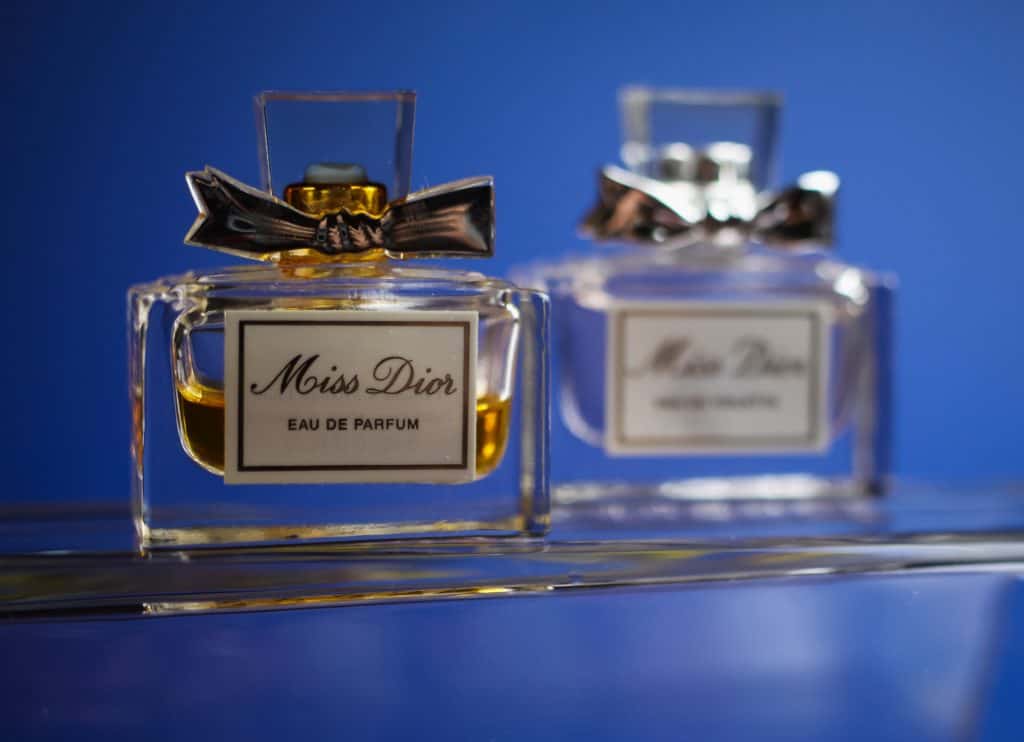The world of perfume is chock full of terminology, a lot of which goes pretty much undefined. Most people can’t tell an eau de parfum from an eau de toilette, much less a perfume from a cologne.
So what is a perfume? What is a cologne? And which one lasts longer?
Perfumes are much longer lasting than colognes. That’s because perfumes contain much higher concentration of perfume oils than an eau de cologne, making them much more tenacious and diffusive.
Want to know more? Let’s take a closer look at the differences between perfumes and colognes.
Perfumes vs. Colognes

If you grew up in the USA like myself, you probably have heard “cologne” and “perfume” used in a non-interchangeable manner. In America, a “cologne” is a men’s fragrance, while a “perfume” is a women’s fragrance, full stop.
If you went up to a guy and asked, “Hey man, what perfume do you wear?” he’d probably look at you like you’re crazy, and the same goes for if you asked a woman, “What cologne are you wearing?”
For the rest of the world, though, this isn’t really a thing. You see, perfume and cologne are actually the same thing. The only difference between the two is the concentration of perfume oils in the blend.
That’s right – that bottle of Dior Sauvage EDP you have? It’s a perfume, not a cologne.
The reason for this is because traditionally, men in America wore what is known as an eau de cologne, and anything labeled as “perfume” was considered the reserve of women. Over time, the use of “cologne” for men and “perfume” for women entered common parlance, and there you have it.
But in actuality, cologne and perfume are just two sides of the same coin. “Cologne” refers specifically to eau de cologne, which is the lightest perfume concentration, with 2-4% concentration of perfume oil to alcohol. “Perfume”, on the other hand, runs the gamut from eaux de cologne, eaux de toilette, eaux de parfum, and extraits de parfum.
In the end, “cologne” is just a variety of perfume, rather than being a separate entity altogether. And though “cologne” is typically considered to be masculine, there are several eaux de cologne designed for women – take, for example, Bvlgari’s Eau Parfumée au Thé Blanc, Chanel’s No. 5 Eau de Cologne, or Guerlain’s Shalimar Cologne.
It all comes down to the concentration of perfume oils. And if you want to know more about perfume concentrations, you can peruse this article for all the details.
Which Lasts Longer?
This is a very simple question to answer: perfume, as in eaux de toilette, eaux de parfum, and extraits de parfum last longer than cologne.
Why? Well, as I mentioned before, it all comes down to the concentration of perfume oils.
Any perfume is made up of a mix of perfume oils and alcohol. Alcohol, of course, evaporates quickly, while oil evaporates at a much slower rate. It stands to reason, then, that perfumes with less alcohol and more oil will linger longer on the skin than those with more alcohol and less oil.
An eau de cologne is concentrated at 2-4% perfume oil to alcohol. It’ll give you about an hour to (if you’re lucky) two hours of scent before disappearing altogether.
Eaux de cologne are deliberately designed that way; they were originally intended for use after bathing, for a quick pick-me-up during the hot days of summer, or indeed even for medicinal purposes, such as for alleviating headaches.
They were never meant to have all-day longevity.
Perfumes, on the other hand, are dosed at between 5-30%+, depending on whether you have an eau de toilette, eau de parfum, or extrait de parfum. Because of the increased oil content, even the shortest lived eau de toilette is longer lasting than an eau de cologne, because they are actually made to last.

You’ll get different longevity depending on the concentration of perfume oil.
| Concentration | Longevity |
| Eau de toilette (5-15%) | ~4-6 hours |
| Eau de parfum (15-20%) | ~6-8 hours |
| Extrait de parfum/parfum (20-30%+) | ~8-12+ hours |
Perfumes are usually more diffusive than colognes, meaning that they have greater projection and sillage. Don’t know what projection and sillage are? Don’t worry: you can learn more about them here and here.
So, in short, perfumes are almost always longer lasting than colognes. While there are some exceptions to the rule (for example, some of the eaux de cologne from Acqua di Parma), for the most part, a perfume will beat out a cologne in terms of longevity, projection, and sillage every time.
The Final Word
You’ve learned that “perfume” and “cologne” are really not very different at all; rather, “cologne” is just one variety of perfume, called eau de cologne.
So guys, really, it’s okay, you can say that you wear perfume, because, objectively speaking, you do. There’s nothing wrong with that; it’s the 21st century, man, get with the times.
Perfumes are generally longer lasting than colognes. That’s because perfumes contain a higher concentration (5-30+%) of perfume oil than colognes, which usually are dosed at 2-4%. The more perfume oil, the longer lasting the scent will be.




